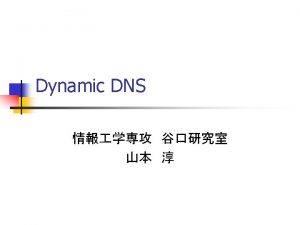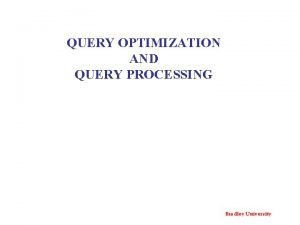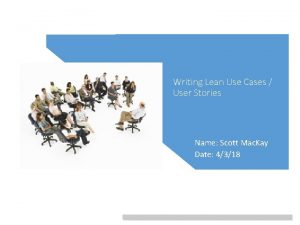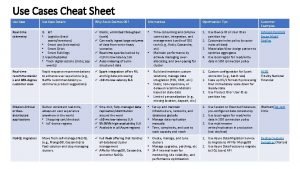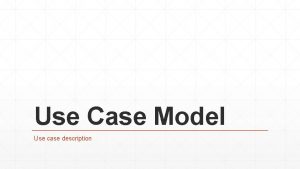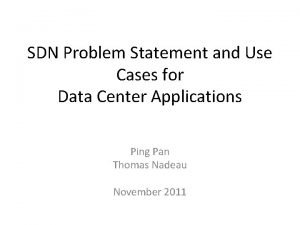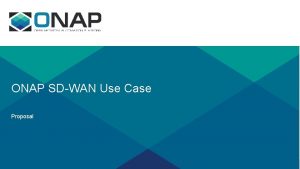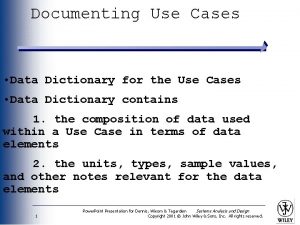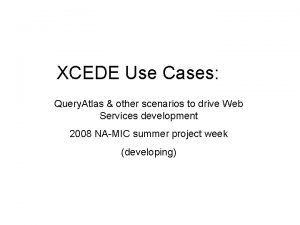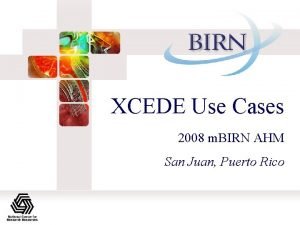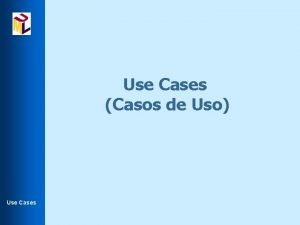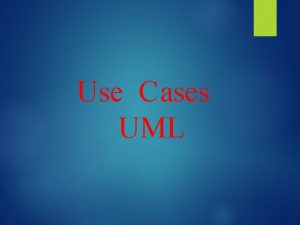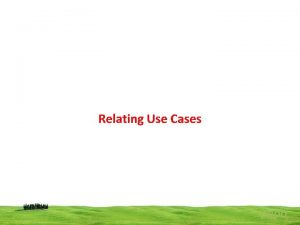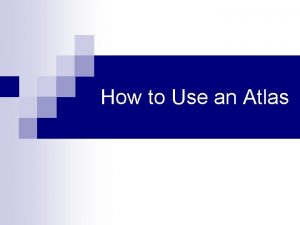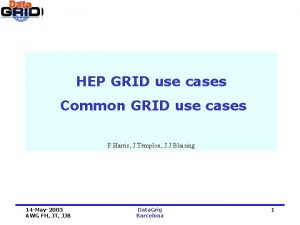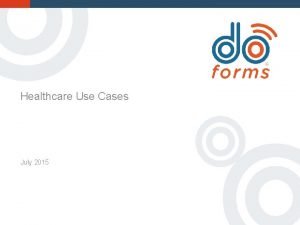XCEDE Use Cases Query Atlas other scenarios 2008














- Slides: 14

XCEDE Use Cases: Query. Atlas & other scenarios 2008 f. BIRN AHM

Overview • User Centered Design for f. BIRN tools • Example Users of Slicer with informatics infrastructure: • f. BIRN researchers (Query. Atlas & population statistics) • Neuroscience labs (image analysis workflow) • Retrospective data sharing (mark-up) • CVRG (statistics & multi-scale information integration) • Image-guided therapy (real-time image access) • Scenarios • Requirements

User-centered design approach Drive tool development with user needs, use cases – ensure that XCEDE web services address use cases of interest. 1. Assess user + developer needs, priorities & develop model 2, 3, 4: Design, Implement, Test, Iterate: * Users evaluate and shape the design (features + interaction) that works for them. * Developers ensure the design’s technical merit, assess community interest & compatibility with priorities. 5: Disseminate & support

Use case: f. BIRN Neuroscientists • Using a web. GUI or a Slicer query mechanism: Search for all SZ subjects that have Free. Surfer + FIPS analyses for a particular experiment. • Or find SZ population statistical analyses and Free. Surfer average morphology data • View downloaded results in Query. Atlas’s ontology- and atlas-based context; choose search terms and query for relevant multi-scale information. • View integrated search results & save all data of interest for continued study. • Export descriptions/data compatible with other atlases • Query must be simple & powerful. Tools must manage & display returned results for clarity.

Use case: Neuroscience labs • Example: Schizophrenia Research • Structural Imaging, DTI, f. MRI • Demographics, Protocols, Clinical Assessments • • Label Maps, Activation Maps Labs often use Ad Hoc methods for data transfer, description & tracking provenance • Shared Network Drive, Access Database, Spreadsheets… • Reluctant to Change if Database Administrator is Required • Would Greatly Benefit from Informatics Infrastructure if Reliable & Easy To Use

Use case: Sharing Retrospective Data • Over 1000 Slicer-Guided Open MR Craniotomies • Large Subset (~200) Cases Collated with Preand Intra-Operative Images • • Various acq. , 1. 5 T and 0. 5 T • GE or NRRD format (not DICOM) National Center for Image Guided Therapy (Jolesz, BWH) Goal to Share the Data • Talos, Archip, and Haker Working with Marcus et al. for Upload to XNAT Central • Mark-up of image data and derived data • Prostate Brachytherapy Data Also Available for Upload

Use case: CVRG • Cardiovascular Research Grid (Winslow, JHU) • Broad Range of Potential inputs: CT, MR, EKG, Pet, DWI… • Initial Three Cases of CT Torso Cases Uploaded to XNAT Central • Data from Drs. Triedman and Jolley, Boston Childrens Pediatric Cardiology • Includes Detailed Heart Segmentation • JHU Canine Heart DTI (Want to use Query. Atlas-style ontology- and atlas-based query for related multi-scale data. )

Use case: Image Guided Therapy • Collect Pre-Therapy Imaging • Run Diverse Analysis Routines • • Evolving Research Code • Multiple Investigators Bring Patient Maps into Real Time Navigation / Robotic System • Feed Procedure Images and Data Back to Database

Scenario 1: Manual Per-Subject Target Clinical Study Scenario: 1. Search XNAT or HID for Target Data (via web GUI or Slicer queries) 2. - Search for project name or subject name of interest: 3. - Search for particular data assigned to you for that project 2. Select datasets of interest for download. 3. Download. xcat file containing URIs for selected datasets 4. Slicer 3 Retrieves Data and Metadata 5. Analysis, Visualization, Annotation 6. Select particular datasets for upload and tag them 7. New Data and Provenance is Uploaded and Linked to Original Data

Scenario 1: Manual Per-Subject XCEDE Working Group discussion: find_subjects request returns a list of subjects and their IDs. get_subjects could be used to retrieve details in Some return fields could also be included: This: find_subjects(project="OASIS", fields="CDR, Age, Dx") Returns this: <List> <Item id="1234" type="subject"> XCEDE format. <Field name="CDR">0</Field> <Field name="Age">87</Field> This: find_subjects(project=“PNL-PROJECT") Returns this: <List> <Field name="Dx">Normal</Field> </Item> <Item id="3456" type="subject"> <Field name="CDR">0. 5</Field> <Item id="1234" type="subject"/> <Field name="Age">84</Field> <Item id="3456" type="subject"/> <Item id="5678" type="subject"/> </List> <Field name="Dx">AD</Field> </Item> <Item id="5678" type="subject"> <Field name="CDR">0</Field> <Field name="Age">65</Field> <Field name="Dx">Normal</Field> </Item> </List>

Scenario 1: Manual Per-Subject Slicer MRML representation for holding results in scene state: vtk. MRMLSlicer. Table. Node & vtk. MRMLSlicer. Table. Storage. Node (M. Halle) Parse and store data in table form… Subject ID Age CDR Dx 1234 87 0 Normal 3456 84 0. 5 5678 65 0 AD Normal • Also allows useful CSV input format for collections of URIs • Any URI table data handed off to appropriate vtk. MRMLURIHandler

Scenario 2: Population Analysis Target Population Study Scenario: 1. Search XNAT or HID Target Population (How will people want to specify search? ) 2. Receive. xcat File of Result URIs 3. Search or Load Parameter Files for Tools – intuitive UI or script 4. Specify Group Statistics Parameters – intuitive UI or script 5. Dispatch Analysis for Remote Processing – intuitive UI or script 6. Results are Uploaded to Database from Remote Analysis Machines 7. Identify f. BIRN tool users who can help us flesh out this scenario & understand user needs?

Scenario 3: Visualization of Statistics Target Visualization Scenario: 1. Search XNAT or HID Processed Studies for diagnosis (SZ), protocol (SIRP), that have both Free. Surfer and FIPS analyses. 2. Select among returned results for studies of interest. 3. Receive. xcat File of Result URIs 4. Parse & load into Slicer / Query. Atlas (tags distinguish data types/formats for intelligent loading) 5. Query for explanatory information 6. Add notes, save query record and relevant information as part of MRML scene 7. Upload MRML scene to database

Requirements • Easy To Install XCEDE Compliant Server • • XNAT Desktop? Web Services API and Web services client tools • The Simpler the Better • Several Examples are Available • • Digital. Bucket, Gene. Network Capability to represent data provenance, and mark up data with custom tags (Assigned To, Completed By)… • Good user feedback (is transfer running? Was it successful? ) • Server-to-Server Data Migration • Automatic Synchronization? • cvs/svn-like checkouts and commits?
 Giuseppe avolio
Giuseppe avolio Criminal cases vs civil cases
Criminal cases vs civil cases Iterative query vs recursive query
Iterative query vs recursive query Query tree and query graph
Query tree and query graph Query tree and query graph
Query tree and query graph 2008 2008
2008 2008 Use cases vs.user stories
Use cases vs.user stories Writing effective use cases by alistair cockburn
Writing effective use cases by alistair cockburn Cosmos cheat
Cosmos cheat Use case description format
Use case description format Couchbase use cases
Couchbase use cases Service chaining use cases
Service chaining use cases Sdn use case
Sdn use case Sd wan proposal
Sd wan proposal Documenting use cases
Documenting use cases


